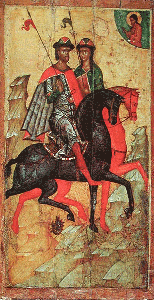Boris and Gleb were the younger and much-beloved sons of Grand Prince Vladimir, the ruler of Kievan Rus, who in 988 brought his subjects to the waters of Holy Baptism. The two brothers were also baptized at which time they received the Christian names Romanus and David.
 The older of the two, Boris, was very gifted and learned to read and write. Boris was particularly esteemed among the people and the soldiery. His popularity provoked bitter jealousy in his eldest brother Svyatopolk (known to history as “the Accursed”) who scorned the laws of the newly adopted Christian religion, so dear to his younger brothers, in favor of satisfying his unbridled ambition. He saw Boris as a rival for the position of Grand Prince, and when Vladimir died Svyatopolk wasted no time in plotting his brother’s murder.
The older of the two, Boris, was very gifted and learned to read and write. Boris was particularly esteemed among the people and the soldiery. His popularity provoked bitter jealousy in his eldest brother Svyatopolk (known to history as “the Accursed”) who scorned the laws of the newly adopted Christian religion, so dear to his younger brothers, in favor of satisfying his unbridled ambition. He saw Boris as a rival for the position of Grand Prince, and when Vladimir died Svyatopolk wasted no time in plotting his brother’s murder.
Boris had been sent by his father to fend off an anticipated raid by the Pechenegs. Boris was well aware of his brother’s long-standing hatred for him and recognized in this message the kiss of Judas. The young prince knew that his life was threatened. Reflecting upon the words of the Gospel: “If any man say, I love God, and hateth his brother, he is a liar,” and “Love thine enemies,” he firmly rejected the advice of his father’s retainers who urged Boris to oust the unpopular Svyatopolk, pledging their support to such a plan, “Be it not for me,” he replied, “to raise my hand against my brother. Now that my father has passed away, let him take the place of my father in my heart.”
Informed that his murderers were approaching, the Prince turned to an icon of the Saviour and prayed beseechingly: “Lord Jesus Christ, Thou didst accept Thy Passion on account of our sins; grant me al so the strength to accept my passion.” As the murderers burst into the tent, Boris’ faithful servant George, a young Hungarian, placed himself between the prince and his attackers in an attempt to save his master’s life. The servant was killed at once, while the Prince, grievously wounded by the thrust of a lance, was bound up in the tent canvas and taken on a cart to Kiev. When Svyatopolk learned that his brother was still alive, he sent two Varangians to consummate the bloody deed, which was accomplished when one of them plunged his sword into Boris’ heart.
Svyatopolk’s next victim was Gleb. Your father has died and Svyatopolk has killed your brother.”
The murderers hired by Svyatopolk caught up with Gleb on the river. He knew that he alone was the object of the pursuit and, like his brother, Gleb urged his company not to offer armed resistance, as they were outnumbered and all would perish. Gleb was killed by his own cook who, terrified into compliance by Svyatopolk’s henchmen, seized the head of the young prince and cut his throat. Although Boris and Glob were not martyred for their faith (they are properly called ‘passion-bearers’ rather than martyrs), their voluntary and meek sacrifice for the sake of averting the suffering of others and preserving the Christian ideal, had a profound effect on the subsequent development of Christianity in Russia.







